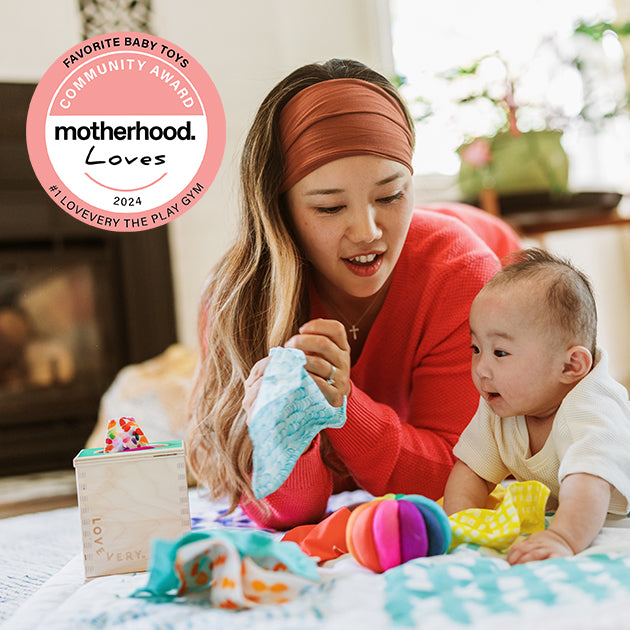
Everything to Know About Meditation & Mindful Birthing

Why Meditate?
A great time to start initiating this type of self-care through meditation is on the journey to conception and continuing that practice during pregnancy and through postpartum. Research shows that women who meditate have children who are better able to self-regulate. And I don't know about you, but I think every mom would love to have a child who is able to self-regulate.
Meditation during pregnancy can help as a form of stress or anxiety reduction and can be an important support system toward regulating your blood pressure, your inflammation levels, and helping baby and you to have a beautiful, healthy, and connected journey.

What kind of meditation is helpful?
The kinds of meditation that I did during my pregnancy really shifted from my typical practice, which is something you might experience, too. My foundational practice is awareness of my breath, so it's a breath-based practice and a body awareness-based practice. We can use many different types of meditation during pregnancy. To connect with baby, we might use visualization practices.
I practiced visualization, not just of my baby, but the position that my baby was in, starting to see her in a position that would be most useful for her birth and delivery. I also visualized the actual birth in and of itself. Visualizing an easeful and graceful birth doesn't mean that it won’t be challenging, but we want to start setting that tone of ease. Simultaneously, I began an affirmation practice. My affirmation was I trust my body, I trust my baby, I trust the process of birth.

How exactly DOES mindful birthing help during pregnancy and birth?
I used visualization, affirmation, and other meditation practices throughout the course of my pregnancy. Then, when I went into labor early at 37 weeks and three days, I didn’t have to think about my practice to feel those benefits. I didn't have my hospital bags packed yet or anything, and delivery happened fast. I had what's called precipitous labor – I went into labor at 11:45 p.m. and she was born at 5:00 a.m. By the time we got to the midwives at the hospital, I was already nine centimeters dilated. Because of my continuous practice, my repetition, my visualization, and my affirmation were already there.
One of the things that we say about meditation is that you're not meditating for the moment that you're in, you're meditating for the moment down the road that we can't predict. You're meditating for the moment when you need your practice the most, which isn't going to be the moment that you're sitting and meditating. You're going to need your practice most when the unexpected occurs. Just like when uncertainty surfaces in motherhood – that's when you're going to need your practice.
As you continue to dedicate yourself to being mindful, your practice is going to be there when those challenges inevitably arise. As we journey into motherhood, we must practice being with uncertainty. The journey of a newborn, the journey of an infant, and even our own lives, is full of the unknown. Development is not linear, and we need to learn to welcome the chaos. We can welcome chaos as an opportunity for growth and expansion, and practice will help us do that.

Meditation through Difficult Pregnancies, Loss, and Infertility
In terms of the meditation practice, especially as pregnant women and new mothers, our job is to be aware of whatever is present for us in this moment, not to try to change it, not to try to make it go away, not to try to fix it. When you meditate, your job isn't to feel better or happier, which I think is hard for people to hear. They want to meditate so that they feel happy. But you might meditate and simply be aware that your heart is heavy. You might be aware that you're sad.
This comes forward especially in those times when we're facing something like a miscarriage, or a pregnancy loss. One in four pregnancies end in a miscarriage or pregnancy loss; so many women are touched by this deep loss. Before I was pregnant with my daughter, I went through a pregnancy loss at about 16 weeks, which is far into a pregnancy for loss. That week or two after, I knew my job was just to be with my grief, to be with my body, to be with myself and not to do what's called spiritual bypass.
For women facing loss like this, or challenges such as infertility, spiritual bypass occurs when we don't deal with what's right here. Meditation: the root of the word means to see things as they really are. Women are especially susceptible to putting on a brave face and saying, “No, I'm fine. I've got it. Thank you so much. We're doing okay.”
But we don't deal with the pain and the heartache that's actually there. And when we don't do that, we keep shoving it down and shutting it down. Then, we might have an emotional explosion, maybe a reaction to our partner, or a surfacing of anxiety. It might show up in our body. Stress on the body can be so detrimental to our health and even our immunity. In times like this, we need to put a hand over our hearts.
Self-compassion means recognizing that this is hard. There's pain here, but I'm not alone. Everyone experiences pain. Everyone experiences suffering. This is a moment of suffering, and it's in that awareness that when we start to heal. I think that for women navigating pregnancy loss, putting that hand over your heart – metaphorically or literally – means letting yourself be with exactly what's there in the moment.
More From Lauren Eckstrom
Click here to learn more about her personal journey with yoga and meditation.
Click here to discover what kinds of meditation might be best for you and beginner tips.
Click here to learn how your meditation practice may change once you become a mom.
Click here if you want to find out how meditation changes you, your body, and even your emotional regulation. The impact of mindfulness extends far beyond a deep breath!






